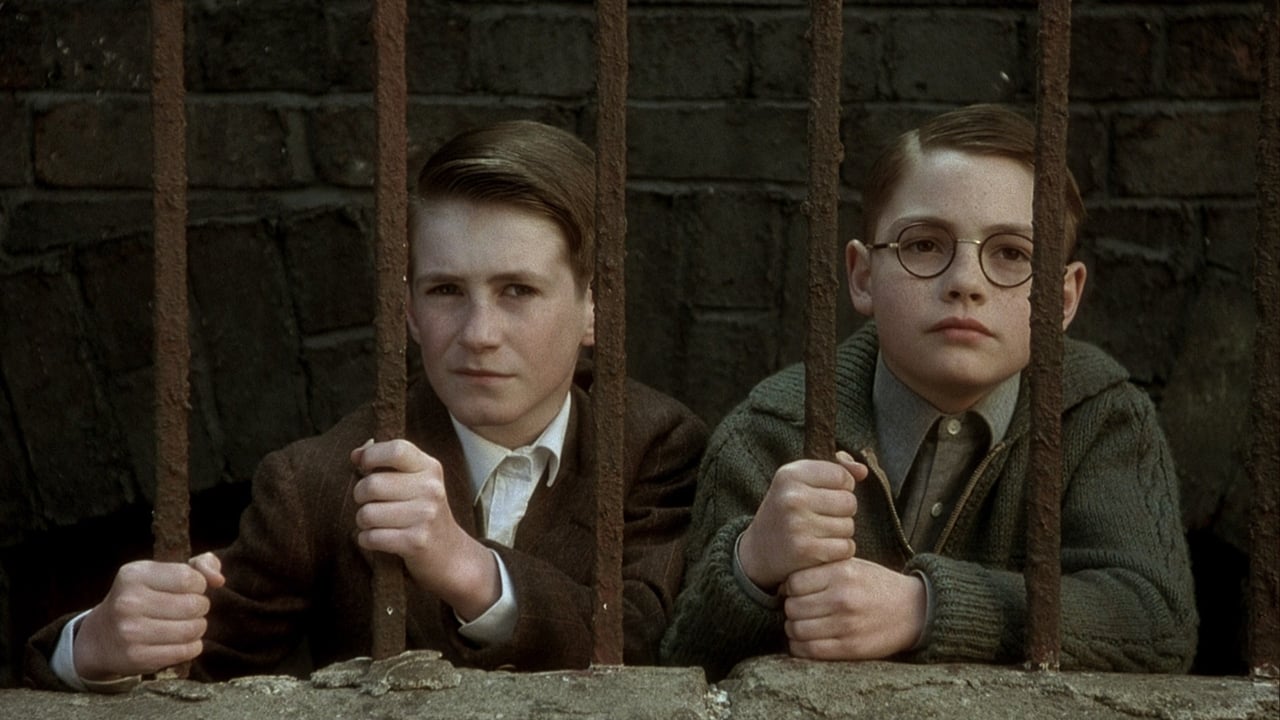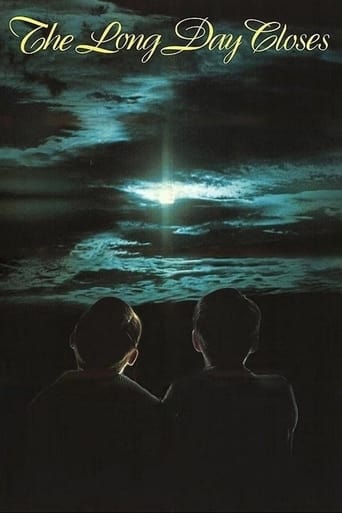

Usually, my response to films in this register is that I write down something right afterwards. This film has tried me for some months now. It is a long time since I have been stupefied for some minutes after the film has ended, and then have given way to sobs out of outer beauty.I have to say right away that Terence Davies equates the long day of paradisaical childhood with the closure our life takes, and this is a take no great romantic poet has taken the chance, perhaps the cinematic chance, to express it so fully in images. And with such musical allegiance.Oh, to be exhausted in beauty! This is the destiny Terence Davies has in trust for us. None to my knowledge, even Bill Douglas to whom Terence Davies pays homage, has given us perhaps the definitive song childhood-to-adolescence love gives its shape to. It took me twice to gather that in the beginning, the rainy, abandoned street is the one early Bud meets for the last time his presumably co-pupil, as he passes him through with another boy to engage in play."The little stars climb, always reminding me that we're apart. You wandered down the lane and far away, leaving me a song that will not die" is what the voice of Charles Ray initiates us to through rain that falls onto that aforementioned abandoned street. But is it really abandoned? is what Davies' film asks us throughout. It gives way to vignettes coming out of childhood with such unabashed nostalgia and lyricism, but always, purposefully, vignettes, that it is a privilege of questioning only the great English and Irish poets Davies draws from have allowed.The image on the carpet so many childhoods have visited, turns now to the windowpane with music that only hints its epic potential via a slight turn of the camera. Soon afterwards, after a sublimely pathetic engagement of mother singing ancient tunes embracing the child, the child sitting by its own on the stairs (stairs the French say are so full of talking), opens up to a scene of shocking beauty with the whole family - mother occupying the front as Christ in the Last Dinner -wishing to Bud happy X-mas, while they are out in the street (that too, took twice a siting), and Mahler's music accompanies Bud and us to this private enraptured witnessing. Here the power passes from the ground to the eyes directly, suffused with an elegiac sustenance that follows out the rest of the film.Yet look also how the chirpy talk of the neighbors' informs the last chapter of initiation into what language in a fully telling and seductive way is. And then the camera lovingly revisits all places that define childhood in a cultural manner: cinema, religion, education. I here opt for the larger categories each place stands for in the sequence, for "Tammy" the song tells me so: the cinematic ray, and the summoning bell, and the film or radio transcripts that interfere with memory.The film transcripts. Ashes fall as it is evocative, and the camera moves for a final appreciation, as they trace their course. Then there's a tiny comic interlude (our teacher said - what? a serious false information, but, oh! so comically delightful!) before the Victorian astonishing attack. The long day closes in an overlapping of music and abandoning image over a submerged by light and clouds sky, descending, descending- Over what? Over the boys' last roof, the image on the carpet, the out-door X-mas and the common, local feast, the Dali-informed boo of the Christ as he turns over on the Cross, the melding and celebrating of the colors and sound (what a terrific sound design!) over what washes childhood. Away? It washed over me. It did.
... View MoreI saw this film with a group of friends, and people either loved it or hated it. As we discussed our reactions, it became clear that the people who hated it were looking for a plot and tuned out when they realized that there wasn't one.I felt somewhat the same way at first until I realized what Terence Davies was doing: He was filming childhood memories and fantasies exactly as he recalled them, with an emphasis on the differences between 1990s Britain and the Britain of his childhood: his sisters washing their hair in the sink and then going out on bicycles on a Saturday evening, homemade musical entertainments, and so on. Some memories were fragmentary, while others were more extensive.Once I realized what he was doing, I just sat back and let the beautifully shot images and evocative music flow over me. It was like peeking into someone else's mind and living bits of his everyday life. The movie stayed with me for a long time, and I began delving into my own childhood memories, wondering what they would look like on film.
... View MoreLondon's NFT recently showed this again for its Terence Davies season. The cinema was packed. It's simply one of the most beautiful films ever made. It uses so many devices to full effect. One scene blends into another; a school room darkens and as the camera pans across, the desks become rows of cinema seats.On a budget, Davies employs so many creative tricks to recreate the 50s, sewn together by memories, through fading light and vignettes, choral music and period songs, and snatches of movie dialogue from the past.The film is a paean to cinema and makes you feel nostalgic for a time and place you weren't even in.
... View MoreIts been said that everyone has a wonderful book in them, if they only had the skill to bring it out. Terence Davies has made several quality films, but The Long Day Closes is his personal masterpiece. Evocative, nostalgic, the film depicts a childhood lost and sweetly remembered at a time and in a nation struggling to right itself following a devastating war. Davies abandons traditional film-making and works from intuition and powerful memories to create something truly special and magnificent. Certainly not for everyone. If you are moved primarily by American Idol, Wrestlemania and NASCAR pileups, and if your idea of nostalgia is reruns of Happy Days, this movie would be a waste of your time.
... View More